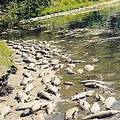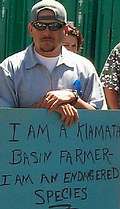 美國眾議院民主黨團7月31日舉行了一場耗時很長的聽證會,來蒐集布希政府官員不當干預幾項影響瀕危物種決策的證據,但是這些民主黨員並未找到這些具爭議決策與副總統錢尼(Dick Cheney)有關的證物。這些不當決策造成美國有史以來魚類死亡數量最高的事件。
美國眾議院民主黨團7月31日舉行了一場耗時很長的聽證會,來蒐集布希政府官員不當干預幾項影響瀕危物種決策的證據,但是這些民主黨員並未找到這些具爭議決策與副總統錢尼(Dick Cheney)有關的證物。這些不當決策造成美國有史以來魚類死亡數量最高的事件。
眾議院資源委員會目前正在調查錢尼介入克萊梅河域(Klamath)魚類死亡事件的申訴案,這個事件因為《華盛頓郵報》6月份的報導而浮上檯面。一位前內政部官員向該報社表示,副總統向管理局施加壓力,要求他們持續供應農民灌溉水源,而不理會聯邦政府有義務公平提供農業利益、3種瀕危魚種所需的水源,以及與美國原住民部落水權三方的水資源。
聯邦官員於是在2002年4月決定將水源分流給農民,這項決定改變一項過去的決策,並且對聯邦生物學家的抗議置之不理。這些生物學家負責監督瀕危物種法案(the Endangered Species Act)的施行。
那次決策變更與之後的魚類死亡事件脫不了關係,造成加州與奧勒岡邊境7萬隻鮭魚死亡。
2004年,內政部檢察總長調查白宮政治顧問羅夫(Karl Rove)干預聯邦官員職務以變更決策的申訴案,但沒有找到受到政治影響的證據。
 先前負責克萊梅河域事件的前聯邦漁業生物學家凱利(Michael Kelly)向委員會表示,他知道錢尼曾經對決策變更計畫傳達意向,但他沒有副總統干預的直接證據。
先前負責克萊梅河域事件的前聯邦漁業生物學家凱利(Michael Kelly)向委員會表示,他知道錢尼曾經對決策變更計畫傳達意向,但他沒有副總統干預的直接證據。
凱利指出:「我注意到布希總統曾經宣示要不計一切方法讓農場獲得水源。」他同時表示他知道他的長官們也被施壓,要求加速評估案的審查,並且轉而提出對農民有利的科學觀點。
民主黨團在7個小時的聽證會中花很多時間討論,以對行政官員政治干預的情形提出更大範圍的申訴案。民主黨議員瑞荷(Rahall)表示:「說到內政部的政治干預與道德淪喪狀況,克萊梅河只是冰山的一角,」他還順便提到最近前內政部長助理部長麥當諾(Julie MacDonald)的一些行動也受到爭議。
House Democrats held a lengthy hearing Tuesday to probe evidence that Bush administration officials improperly meddled with several decisions affecting endangered species, but they failed to find the smoking gun directly linking Vice President Dick Cheney to a controversial decision that contributed to the largest fish kill in U.S. history.
The House Resources Committee is investigating allegations of Cheney's involvement in the Klamath fish kill that surfaced in a "Washington Post" story in June. A former Interior Department official told the paper the vice president pressured the agency to maintain irrigation flows to farmers despite federal obligations to balance agricultural interests with the water needs of three endangered fish species and the tribal water rights of Native Americans.
Federal officials subsequently decided in April 2002 to divert water for farmers, reversing a past policy and ignoring the objections of federal biologists tasked with upholding the Endangered Species Act.
The diversion was in part responsible for a fish kill that left some 70,000 salmon dead near the California-Oregon border.
In 2004, the Interior Department's Inspector General investigated allegations that Karl Rove interfered with federal officials to enact the controversial decision, but found no evidence of political influence by the White House political advisor.
Michael Kelly, a former fisheries biologist who worked on the Klamath issue, told the committee he knew Cheney had been briefed on the plan, but had no direct evidence of any interference by the vice president.
"I was aware that President [George W.] Bush had declared he'd do everything he could to get water to the farms," Kelly told the committee, adding that he knew his superiors were being pressured to speed up assessments and tilt the science to favor the farmers.
Democrats spent much of the seven hour hearing discussing broader allegations of political interference by administration officials. "When it comes to political interference and ethical lapses at the department, the Klamath River is just the tip of the iceberg," Rahall said, noting recent controversy surrounding the actions of former Interior Deputy Assistant Secretary Julie MacDonald.
全文及圖片詳見ENS




